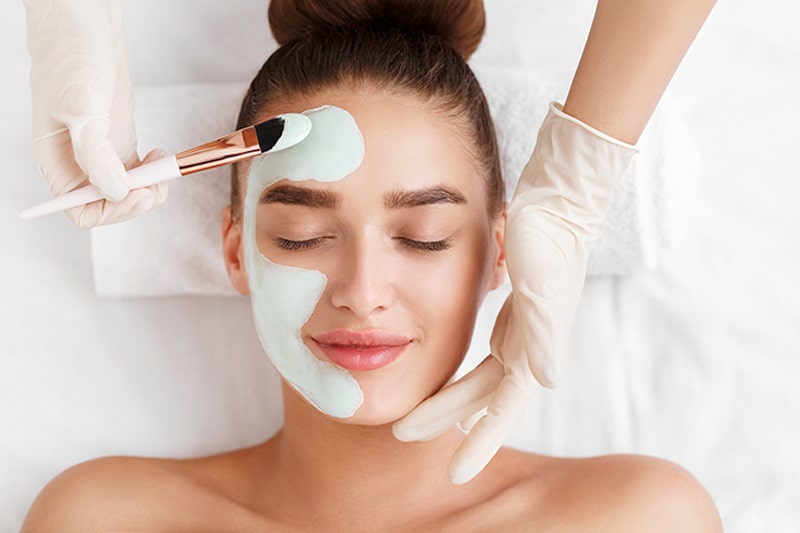
Esthetics Instructor
Educational Objectives
The educational objectives for the Esthetics Instructor Training Program are designed to develop effective teaching techniques, master the subject matter, and learn the laws that regulate the industry by:
• Educating students to be professional, knowledgeable, and skilled for employment within the industry.
• Imparting knowledge through instruction in the latest teaching principles.
• Developing the assessment process of student learning and the instructional strategies to ensure student learning experiences are delivered effectively.
• Fostering a positive classroom environment that teaches courtesy and professionalism as the foundation of a successful career.
• Preparing the student instructor to successfully pass the State Licensing Exam for entry-level employment.
• Training and graduating student instructors while empowering them to become confident and excited to enter a successful career as esthetics instructors.
Pre-requisites
Prospective students must hold a high school diploma or GED equivalent, be a U.S. citizen or permanent resident, and have an esthetics license and experience in the field.
Grading Procedure
Academic learning is evaluated after each unit of study by a written exam. Practical assignments are evaluated as completed and counted toward course completion only when rated as satisfactory. If the performance does not meet satisfactory requirements, it is not counted and the performance must be repeated. At least two comprehensive practical skills evaluations will be conducted during the course of study. Practical skills are evaluated according to text procedures and include Theory Lesson Plan and Lecture and Practical Lesson Plan and Demonstration. Students must pass with a 75% to be making academic satisfactory progress and to be eligible for graduation. Students must maintain a grade average of 75%. Students must make up all failed or missed exams. Numerical grades are considered according to the following scale:
A 90-100%
B 80-89%
C 75-79%
F 74% and Below
The curriculum for students enrolled in the Esthetics Instructor Training program will exceed minimums set by the state of Georgia and will include 600 hours of theory and technical instruction. The curriculum for an Esthetics Instructor training course shall be completed within nine months and 600 hours of training as stated below. Esthetics Instructor Training students shall spend all their training time under the direct supervision of a licensed instructor and shall not be left in charge of students or schools at any time without the direct supervision of a licensed instructor.
The 600 hours of instruction required for the Esthetics Instructor license shall be apportioned as follows:
GENERAL EDUCATION Requirements: 150 clock hours
• Cosmetology and Barber Laws and Rules: (25 clock hours)
• Principles of Teaching Esthetics: (125 clock hours)
TEACHING TECHNIQUES AND AUDIO-VISUAL AIDS: (175 clock hours)
• Curriculum Development
• Lesson Plans and Presentations
• Classroom Management and Discipline
• Demonstrations and Theory Lectures
• Various Methods of Evaluation
PRACTICE TEACHING: (175 clock hours)
STUDENT MOTIVATION AND LEARNING: (100 clock hours)
• Student participation expectations
• Student personalities and motivations
• State Board requirements and record keeping
• Evaluation techniques
Total Hours – 600
Full Time Esthetics Instructor Training Syllabus:
| Week | Subject |
| 1 | The Career Education Instructor/The Teaching Plan & Learning Environment |
| 2 | Basic Learning Styles and Principles |
| 3 | Effective Classroom Management and Supervision |
| 4 | Basic Methods of Teaching and Learning |
| 5 | Program Review, Development and Lesson Planning |
| 6 | Educational Aids and Technology in the Classroom/ Effective Presentations |
| 7 | Assessing Progress and Advising Students |
| 8 | Making the Student Salon an Adventure |
| 9 | Career and Employment Preparation |
| 10 | Educator Relationships, Achieving Learner Results |
| 11 | Learning is a Laughing Matter, Teaching Study & Testing Skills |
| 12 | Teaching Success Strategies for a Winning Career, Teams at Work |
| 13 | Communicating Confidently, The Art of Retaining Students |
| 14 | Evaluating Professional Performance |
| 15 - 16 | Review and State Board Preparation |
Course Curriculum
All courses taught at Dalton Institute will be offered in the English language.
There are:
600 total hours of coursework required for Esthetics Instructor students.
When coursework has been successfully completed and all fees have been paid, students will then be eligible to take the GA State Board Exam. The Georgia State Board evaluates practical work, theory comprehension, and state board rules and laws.
Dalton Institute of Esthetics and Cosmetology utilizes the Milady curriculum for each course. The books are as follows:
Milady Standard Esthetics Fundamentals, 12th Edition- ISBN-14:9780357263792
Master Educator, 3rd Edition- ISBN-13: 9781133693697
Teaching Methods
Our school provides many teaching methods to offer you a comprehensive education, regardless of your learning style. The academic programs are designed to provide theoretical training and practical applications to instill good work habits, ethics, and professionalism. These methods include Interactive Lecture, Demonstration, Individualized Instruction, Group Discussion, Question and Answer, Role Playing, Field Trips, Guest Speakers, Problem Solving, Assignments, and Stories/Testimonials. Dalton Institute of Esthetics and Cosmetology believes that for our students to succeed, they will experience a three-step approach to our education model:
Students will:
LEARN IT with lectures and visual aids,
WATCH IT with live demonstrations by instructors and guest presenters, and
DO IT by performing services on mannequins and real clients.
Tuition and Other Costs
Program Costs:
Esthetics Instructor – $6,000
Books/Kit/Tuition Included
Administrative Fee for all students: Application Fee $20.00 (Non-Refundable)
Administrative Fee for all TRANSFER students: Registration Fee $125.00 (Non-Refundable)
WITHDRAWAL FEE FOR ALL PROGRAMS: Withdrawal Fee $100.00 (Non-Refundable)
Tuition Breakdown for Charges by Payment Period in Esthetics Instructor program:
600 hours (100% charged/disbursed in 2 equal charges of 0 hours & 300 hours) = Tuition of $3000. Each 300 hours of instruction.
Total Cost $6,000
All Tuition Will Be Charged And All Financial Aid Eligible Funds Are Processed For Each Of The Payment Periods
Esthetics Instructor Training
Payment Period 1: 1-300 Hours
Payment Period 2: 301-600 Hours
Student Kits
You will receive your student kit that is specific to the program you have enrolled into. Each kit is included in the price of tuition and the supplies in this kit are the tools for your success during your time here at Dalton Institute. It is extremely important that you take care of your kit and the supplies, as you should be using them every day for the duration of your education. The student kit must be kept at the school. We provide you with a student kit so that you may practice your new skills in school. If for any reason, your student kit needs to be replaced, this will be the financial responsibility and obligation of you, the student. Students are to use supplies from their kits for practice during all course instruction. Additional scrubs, t-shirts or other Dalton Institute apparel may be available for purchase. Check with your Instructor for a current list of items.
Esthetics Instructor Training
1. A current copy of the laws and rules of the Georgia State Board of Cosmetology.
2. All teaching demonstration materials will be provided by the school as needed throughout the course.
SUPPLIES: All other supplies are furnished by the school. Students are not allowed to bring in supplies from outside the school without the approval of an instructor. At no time shall outside products be used on any school clients without prior approval.
Maximum Time Frame
The maximum time frame a student must complete the course is within 150% of the contracted end date. Periods during which a student has formally requested and received a leave of absence will extend the student’s contract and maximum time frame by the exact number of days in the leave of absence. Scheduled holidays or bad weather will not count in this calculation. Periods of illness, excused or unexcused absences, are counted in this calculation. Transfer hours from another institution that are accepted toward the student’s educational program are counted as both attempted and completed hours for the purpose of determining when the allowable maximum timeframe has been exhausted. SAP periods are based on scheduled contracted hours at this institution.
The chart below gives an example of the maximum time allowed for regular full-time and part-time scheduled students:
Esthetics Instructor - Full time 32 hours per week: 600 hours ÷ 32 hours/week = 19 weeks. 19 weeks x 150% = 29 weeks max.
The maximum time allowed for transfer students who need less than the full course requirements or part-time students will be determined based on their scheduled hours.
Any student exceeding the maximum time frame will be considered as passing if academic and theory grades are satisfactory. Any student who exceeds the maximum timeframe will be terminated from the program and would thereafter be permitted to re-enroll into the same program on a prorated cash-pay basis.


